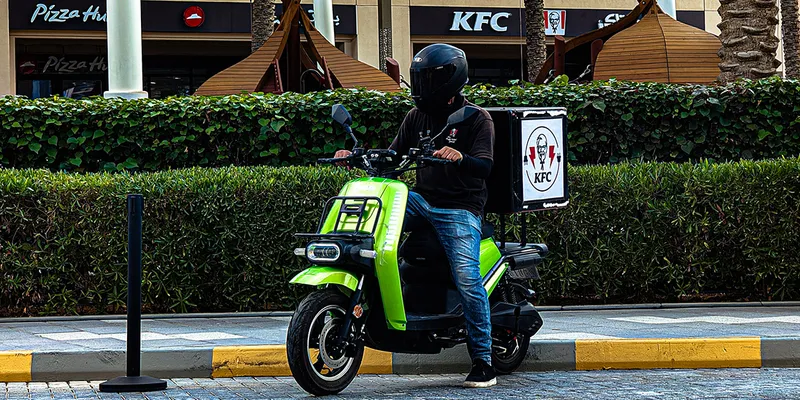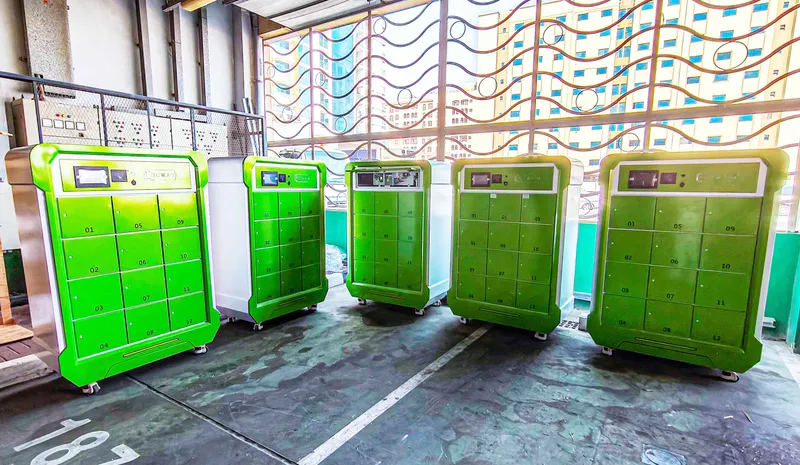Sustainable mobility: Eco Way wants to spearhead green deliveries in Dubai with e-bikes
Dubai-based B2B electric two-wheeler rental startup Eco Way wants to make mobility sustainable in the UAE. It is currently testing 45 e-bikes.
The UAE government aims for net zero carbon emissions by 2050 by enabling businesses that promote the use of electric vehicles (EVs). The e-bike market in the UAE is thriving due to the surge in last-mile delivery services driven by ecommerce.
Ivan Kroshny, a Ukrainian businessman who moved to Dubai in 2021 to open the Roasters Specialty Coffee House chain, noticed that delivery persons in the city would primarily use gasoline bikes or scooters to carry out their jobs. This significantly contributed to CO2 emissions and Polycyclic Aromatic Hydrocarbons (PAH), which can cause respiratory illnesses.
“Motorcycles emit high CO2 emissions, causing noise pollution and environmental damage. Considering that the Dubai government is very concerned about people's quality of life, it was evident that a project related to replacing gasoline bikes with electric bikes would be highly in demand in this city,” Kroshny tells YS Gulf.
In 2023, Kroshny, using his experience in manufacturing electric vehicles in China, set up EV delivery startup Eco Way to replace gasoline bikes.
Kroshny and his team of five people have studied the market, transport demand, battery usage, and factors affecting the speed and range of EVs. After over four months of brainstorming, the startup decided to focus on the short-term delivery segment in the UAE.
What does it offer?
Eco Way has developed three versions of its proprietary e-bikes for delivery: H-9 City, H-9 SPORT, and H-9 PRO. The e-bikes are capable of reaching speeds of 100-110 km/h and have a range of up to 120 KM. They are equipped with a GPS tracker for real-time tracking.
“It was a challenge to modify existing electric bike models to cater to couriers' needs, with early models with speeds of 55-85 km/h displaying no issues. To create a consistently operating bike, we developed a version with 110 km/h speed, extended wheelbase, metallic-coated brake pads, and windshields for efficient braking and comfortable use on Dubai's highways,” the founder states.
Eco Way's bikes are powered by CATL batteries. CATL is a China-headquartered company that manufactures and distributes batteries for electric vehicles and energy storage systems.

EcoWay e-bikes
The bikes feature triple lithium batteries, specifically 72V 60AH CATL NCM, which are reliable in hot climates like that in Dubai and are equipped with nano-rivet technology for structural reinforcement and improved energy density. Using AI, the startup monitors battery temperature, voltage, and other parameters in real-time. The batteries are also resistant to significant overloads.
“Each battery is equipped with a GPS tracker for real-time tracking,” Kroshny explains.
The startup offers its electric two-wheelers on a lease or rent basis. The lease contract includes free parts, servicing, and maintenance for the entire duration.
Charging station network
Eco Way e-bikes come with two batteries, enabling couriers to use one while charging the other and swap them at any of its 13 charging stations. Replacing a battery takes 1.5 minutes, the company says, and involves scanning the QR code.
“We understand in a city like Dubai, where many people use courier services, a significant number of kilometres have to be covered each day. Therefore, it was decided to develop a network of charging stations,” Kroshny explains.

EcoWay Battery Station
The battery replacement stations feature 12 charging slots and are connected to the internet for real-time monitoring of voltage, temperature, and other indicators.
“Our battery replacement stations do not require special network connections and can be plugged into a standard outlet, allowing for installation anywhere. To ensure safety, the charging stations are equipped with an active fire suppression system,” he says. Additionally, the startup claims that the battery casing is constructed using protective materials that prevent fire and undergo rigorous testing.
Driving business
The Dubai-based startup is still in the testing phase and plans to charge around Rs 9.5 (AED 0.4) per kilowatt hour in the city. For example, a full charge of a 4.32 kWh battery would be Rs 40 (AED 1.74).
The electric bikes are rented out for Rs 80 (AED 3.5) for a single battery change that covers 130 km and come with a 50x50x50 cm rear box. “In the UAE, electricity prices are indeed very stable, allowing us to more easily calculate our economic indicators which are tied to the price of electricity for each battery slot,” Kroshny states.
At the moment, the startup is testing 45 electric bikes in the UAE.
The startup has calculated the payback period for the Dubai market by supplying 2,500 bikes and 5,000 batteries monthly is 29 months, and the internal rate of return (IRR) per annum is 99.65%. They plan to reach their targets soon.
It plans to introduce 90,000 bikes, 180,000 batteries, and install 8,182 swappable stations over the next 36 months.
Global Care is helping customers in the Middle East access healthcare services
The startup has tied up with brands including Talabat, Pizza Hut, Hardeez, Amazon, Deliveroo, Uplift, KFC, and Emirates Post Group.
It has forged partnerships with Dubai Municipality and major delivery services, tailoring bike models to their specifications. The company plans to monetise carbon credits and is currently in negotiations with financial institutions.
The startup competes with companies such as Fetchr and Neo Mobility. According to the founder, its battery capacity, bike range and adaptability set it apart from the competition.
On the horizon
The Dubai Water and Electricity Authority (DEWA) predicts a rise in the number of electric vehicles (EVs) in Dubai, with an estimated 7,331 EVs in 2023 and 12,852 by 2025.
UAE’s electric vehicle market is projected to experience a CAGR of approximately 28.5% from 2024-30, as per MarkNtel Advisor.
Eco Way plans to expand its operations to other Emirates, Persian Gulf countries, and Europe. It already started operations in Indonesia in January, focusing on retail bike sales.
As an additional revenue stream, the company is considering introducing targeted advertising based on user data to make marketing more effective.
“This will allow us to expand our operations and bring more electric bikes and charging stations to the UAE,” he adds.
For any press related queries or to share your press releases, write to us at
[email protected].
Edited by Kanishk Singh







